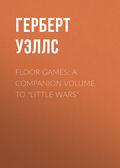
Герберт Джордж Уэллс
Mr. Britling Sees It Through
§ 2
If he had not crushed a child other people had. Such things happened. Vicariously at any rate he had crushed many children…
Why are children ever crushed?
And suddenly all the pain and destruction and remorse of all the accidents in the world descended upon Mr. Britling.
No longer did he ask why am I such a fool, but why are we all such fools? He became Man on the automobile of civilisation, crushing his thousands daily in his headlong and yet aimless career…
That was a trick of Mr. Britling's mind. It had this tendency to spread outward from himself to generalised issues. Many minds are like that nowadays. He was not so completely individualised as people are supposed to be individualised – in our law, in our stories, in our moral judgments. He had a vicarious factor. He could slip from concentrated reproaches to the liveliest remorse for himself as The Automobilist in General, or for himself as England, or for himself as Man. From remorse for smashing his guest and his automobile he could pass by what was for him the most imperceptible of transitions to remorse for every accident that has ever happened through the error of an automobilist since automobiles began. All that long succession of blunderers became Mr. Britling. Or rather Mr. Britling became all that vast succession of blunderers.
These fluctuating lapses from individuation made Mr. Britling a perplexity to many who judged only by the old personal standards. At times he seemed a monster of cantankerous self-righteousness, whom nobody could please or satisfy, but indeed when he was most pitiless about the faults of his race or nation he was really reproaching himself, and when he seemed more egotistical and introspective and self-centred he was really ransacking himself for a clue to that same confusion of purposes that waste the hope and strength of humanity. And now through the busy distresses of the night it would have perplexed a watching angel to have drawn the line and shown when Mr. Britling, was grieving for his own loss and humiliation and when he was grieving for these common human weaknesses of which he had so large a share.
And this double refraction of his mind by which a concentrated and individualised Britling did but present a larger impersonal Britling beneath, carried with it a duplication of his conscience and sense of responsibility. To his personal conscience he was answerable for his private honour and his debts and the Dower House he had made and so on, but to his impersonal conscience he was answerable for the whole world. The world from the latter point of view was his egg. He had a subconscious delusion that he had laid it. He had a subconscious suspicion that he had let it cool and that it was addled. He had an urgency to incubate it. The variety and interest of his talk was largely due to that persuasion, it was a perpetual attempt to spread his mental feathers over the task before him…
§ 3
After this much of explanation it is possible to go on to the task which originally brought Mr. Direck to Matching's Easy, the task that Massachusetts society had sent him upon, the task of organising the mental unveiling of Mr. Britling. Mr. Direck saw Mr. Britling only in the daylight, and with an increasing distraction of the attention towards Miss Cecily Corner. We may see him rather more clearly in the darkness, without any distraction except his own.
Now the smashing of Gladys was not only the source of a series of reproaches and remorses directly arising out of the smash; it had also a wide system of collateral consequences, which were also banging and blundering their way through the Britling mind. It was extraordinarily inconvenient in quite another direction that the automobile should be destroyed. It upset certain plans of Mr. Britling's in a direction growing right out from all the Dower House world in which Mr. Direck supposed him to be completely set and rooted. There were certain matters from which Mr. Britling had been averting his mind most strenuously throughout the week-end. Now, there was no averting his mind any more.
Mr. Britling was entangled in a love affair. It was, to be exact, and disregarding minor affinities, his eighth love affair. And the new automobile, so soon as he could drive it efficiently, was to have played quite a solvent and conclusive part in certain entangled complications of this relationship.
A man of lively imagination and quick impulses naturally has love affairs as he drives himself through life, just as he naturally has accidents if he drives an automobile.
And the peculiar relations that existed between Mr. Britling and Mrs. Britling tended inevitably to make these love affairs troublesome, undignified and futile. Especially when they were viewed from the point of view of insomnia.
Mr. Britling's first marriage had been a passionately happy one. His second was by comparison a marriage in neutral tint. There is much to be said for that extreme Catholic theory which would make marriage not merely lifelong but eternal. Certainly Mr. Britling would have been a finer if not a happier creature if his sentimental existence could have died with his first wife or continued only in his love for their son. He had married in the glow of youth, he had had two years of clean and simple loving, helping, quarrelling and the happy ending of quarrels. Something went out of him into all that, which could not be renewed again. In his first extremity of grief he knew that perfectly well – and then afterwards he forgot it. While there is life there is imagination, which makes and forgets and goes on.
He met Edith under circumstances that did not in any way recall his lost Mary. He met her, as people say, "socially"; Mary, on the other hand, had been a girl at Newnham while he was a fellow of Pembroke, and there had been something of accident and something of furtiveness in their lucky discovery of each other. There had been a flush in it; there was dash in it. But Edith he saw and chose and had to woo. There was no rushing together; there was solicitation and assent. Edith was a Bachelor of Science of London University and several things like that, and she looked upon the universe under her broad forehead and broad-waving brown hair with quiet watchful eyes that had nothing whatever to hide, a thing so incredible to Mr. Britling that he had loved and married her very largely for the serenity of her mystery. And for a time after their marriage he sailed over those brown depths plumbing furiously.
Of course he did not make his former passion for Mary at all clear to her. Indeed, while he was winning Edith it was by no means clear to himself. He was making a new emotional drama, and consciously and subconsciously he dismissed a hundred reminiscences that sought to invade the new experience, and which would have been out of key with it. And without any deliberate intention to that effect he created an atmosphere between himself and Edith in which any discussion of Mary was reduced to a minimum, and in which Hugh was accepted rather than explained. He contrived to believe that she understood all sorts of unsayable things; he invented miracles of quite uncongenial mute mutuality…
It was over the chess-board that they first began to discover their extensive difficulties of sympathy. Mr. Britling's play was characterised by a superficial brilliance, much generosity and extreme unsoundness; he always moved directly his opponent had done so – and then reflected on the situation. His reflection was commonly much wiser than his moves. Mrs. Britling was, as it were, a natural antagonist to her husband; she was as calm as he was irritable. She was never in a hurry to move, and never disposed to make a concession. Quietly, steadfastly, by caution and deliberation, without splendour, without error, she had beaten him at chess until it led to such dreadful fits of anger that he had to renounce the game altogether. After every such occasion he would be at great pains to explain that he had merely been angry with himself. Nevertheless he felt, and would not let himself think (while she concluded from incidental heated phrases), that that was not the complete truth about the outbreak.
Slowly they got through the concealments of that specious explanation. Temperamentally they were incompatible.
They were profoundly incompatible. In all things she was defensive. She never came out; never once had she surprised him halfway upon the road to her. He had to go all the way to her and knock and ring, and then she answered faithfully. She never surprised him even by unkindness. If he had a cut finger she would bind it up very skilfully and healingly, but unless he told her she never discovered he had a cut finger. He was amazed she did not know of it before it happened. He piped and she did not dance. That became the formula of his grievance. For several unhappy years she thwarted him and disappointed him, while he filled her with dumb inexplicable distresses. He had been at first so gay an activity, and then he was shattered; fragments of him were still as gay and attractive as ever, but between were outbreaks of anger, of hostility, of something very like malignity. Only very slowly did they realise the truth of their relationship and admit to themselves that the fine bud of love between them had failed to flower, and only after long years were they able to delimit boundaries where they had imagined union, and to become – allies. If it had been reasonably possible for them to part without mutual injury and recrimination they would have done so, but two children presently held them, and gradually they had to work out the broad mutual toleration of their later relations. If there was no love and delight between them there was a real habitual affection and much mutual help. She was proud of his steady progress to distinction, proud of each intimation of respect he won; she admired and respected his work; she recognised that he had some magic, of liveliness and unexpectedness that was precious and enviable. So far as she could help him she did. And even when he knew that there was nothing behind it, that it was indeed little more than an imaginative inertness, he could still admire and respect her steady dignity and her consistent honourableness. Her practical capacity was for him a matter for continual self-congratulation. He marked the bright order of her household, her flowering borders, the prosperous high-born roses of her garden with a wondering appreciation. He had never been able to keep anything in order. He relied more and more upon her. He showed his respect for her by a scrupulous attention to her dignity, and his confidence by a franker and franker emotional neglect. Because she expressed so little he succeeded in supposing she felt little, and since nothing had come out of the brown depths of her eyes he saw fit at last to suppose no plumb-line would ever find anything there. He pursued his interests; he reached out to this and that; he travelled; she made it a matter of conscience to let him go unhampered; she felt, she thought – unrecorded; he did, and he expressed and re-expressed and over-expressed, and started this and that with quick irrepressible activity, and so there had accumulated about them the various items of the life to whose more ostensible accidents Mr. Direck was now for an indefinite period joined.
It was in the nature of Mr. Britling to incur things; it was in the nature of Mrs. Britling to establish them. Mr. Britling had taken the Dower House on impulse, and she had made it a delightful home. He had discovered the disorderly delights of mixed Sunday hockey one weekend at Pontings that had promised to be dull, and she had made it an institution… He had come to her with his orphan boy and a memory of a passionate first loss that sometimes, and more particularly at first, he seemed to have forgotten altogether, and at other times was only too evidently lamenting with every fibre of his being. She had taken the utmost care of the relics of her duskily pretty predecessor that she found in unexpected abundance in Mr. Britling's possession, and she had done her duty by her sometimes rather incomprehensible stepson. She never allowed herself to examine the state of her heart towards this youngster; it is possible that she did not perceive the necessity for any such examination…
So she went through life, outwardly serene and dignified, one of a great company of rather fastidious, rather unenterprising women who have turned for their happiness to secondary things, to those fair inanimate things of household and garden which do not turn again and rend one, to aestheticisms and delicacies, to order and seemliness. Moreover she found great satisfaction in the health and welfare, the growth and animation of her own two little boys. And no one knew, and perhaps even she had contrived to forget, the phases of astonishment and disillusionment, of doubt and bitterness and secret tears, that spread out through the years in which she had slowly realised that this strange, fitful, animated man who had come to her, vowing himself hers, asking for her so urgently and persuasively, was ceasing, had ceased, to love her, that his heart had escaped her, that she had missed it; she never dreamt that she had hurt it, and that after its first urgent, tumultuous, incomprehensible search for her it had hidden itself bitterly away…
§ 4
The mysterious processes of nature that had produced Mr. Britling had implanted in him an obstinate persuasion that somewhere in the world, from some human being, it was still possible to find the utmost satisfaction for every need and craving. He could imagine as existing, as waiting for him, he knew not where, a completeness of understanding, a perfection of response, that would reach all the gamut of his feelings and sensations from the most poetical to the most entirely physical, a beauty of relationship so transfiguring that not only would she – it went without saying that this completion was a woman – be perfectly beautiful in its light but, what was manifestly more incredible, that he too would be perfectly beautiful and quite at his ease… In her presence there could be no self-reproaches, no lapses, no limitations, nothing but happiness and the happiest activities… To such a persuasion half the imaginative people in the world succumb as readily and naturally as ducklings take to water. They do not doubt its truth any more than a thirsty camel doubts that presently it will come to a spring.
This persuasion is as foolish as though a camel hoped that some day it would drink from such a spring that it would never thirst again. For the most part Mr. Britling ignored its presence in his mind, and resisted the impulses it started. But at odd times, and more particularly in the afternoon and while travelling and in between books, Mr. Britling so far succumbed to this strange expectation of a wonder round the corner that he slipped the anchors of his humour and self-contempt and joined the great cruising brotherhood of the Pilgrims of Love…
In fact – though he himself had never made a reckoning of it – he had been upon eight separate cruises. He was now upon the eighth…
Between these various excursions – they took him round and about the world, so to speak, they cast him away on tropical beaches, they left him dismasted on desolate seas, they involved the most startling interventions and the most inconvenient consequences – there were interludes of penetrating philosophy. For some years the suspicion had been growing up in Mr. Britling's mind that in planting this persuasion in his being, the mysterious processes of Nature had been, perhaps for some purely biological purpose, pulling, as people say, his leg, that there were not these perfect responses, that loving a woman is a thing one does thoroughly once for all – or so – and afterwards recalls regrettably in a series of vain repetitions, and that the career of the Pilgrim of Love, so soon as you strip off its credulous glamour, is either the most pitiful or the most vulgar and vile of perversions from the proper conduct of life. But this suspicion had not as yet grown to prohibitive dimensions with him, it was not sufficient to resist the seasons of high tide, the sudden promise of the salt-edged breeze, the invitation of the hovering sea-bird; and he was now concealing beneath the lively surface of activities with which Mr. Direck was now familiar, a very extensive system of distresses arising out of the latest, the eighth of these digressional adventures…
Mr. Britling had got into it very much as he had got into the ditch on the morning before his smash. He hadn't thought the affair out and he hadn't looked carefully enough. And it kept on developing in just the ways he would rather that it didn't.
The seventh affair had been very disconcerting. He had made a fool of himself with quite a young girl; he blushed to think how young; it hadn't gone very far, but it had made his nocturnal reflections so disagreeable that he had – by no means for the first time – definitely and forever given up these foolish dreams of love. And when Mrs. Harrowdean swam into his circle, she seemed just exactly what was wanted to keep his imagination out of mischief. She came bearing flattery to the pitch of adoration. She was the brightest and cleverest of young widows. She wrote quite admirably criticism in the Scrutator and the Sectarian, and occasionally poetry in the Right Review– when she felt disposed to do so. She had an intermittent vein of high spirits that was almost better than humour and made her quickly popular with most of the people she met, and she was only twenty miles away in her pretty house and her absurd little jolly park.
There was something, she said, in his thought and work that was like walking in mountains. She came to him because she wanted to clamber about the peaks and glens of his mind.
It was natural to reply that he wasn't by any means the serene mountain elevation she thought him, except perhaps for a kind of loneliness…
She was a great reader of eighteenth century memoirs, and some she conveyed to him. Her mental quality was all in the vein of the friendships of Rousseau and Voltaire, and pleasantly and trippingly she led him along the primrose path of an intellectual liaison. She came first to Matching's Easy, where she was sweet and bright and vividly interested and a great contrast to Mrs. Britling, and then he and she met in London, and went off together with a fine sense of adventure for a day at Richmond, and then he took some work with him to her house and stayed there…
Then she went away into Scotland for a time and he wanted her again tremendously and clamoured for her eloquently, and then it was apparent and admitted between them that they were admirably in love, oh! immensely in love.
The transitions from emotional mountaineering to ardent intimacies were so rapid and impulsive that each phase obliterated its predecessor, and it was only with a vague perplexity that Mr. Britling found himself transferred from the rôle of a mountainous objective for pretty little pilgrims to that of a sedulous lover in pursuit of the happiness of one of the most uncertain, intricate, and entrancing of feminine personalities. This was not at all his idea of the proper relations between men and women, but Mrs. Harrowdean had a way of challenging his gallantry. She made him run about for her; she did not demand but she commanded presents and treats and surprises; she even developed a certain jealousy in him. His work began to suffer from interruptions. Yet they had glowing and entertaining moments together that could temper his rebellious thoughts with the threat of irreparable loss. "One must love, and all things in life are imperfect," was how Mr. Britling expressed his reasons for submission. And she had a hold upon him too in a certain facile pitifulness. She was little; she could be stung sometimes by the slightest touch and then her blue eyes would be bright with tears.
Those possible tears could weigh at times even more than those possible lost embraces.
And there was Oliver.
Oliver was a person Mr. Britling had never seen. He grew into the scheme of things by insensible gradations. He was a government official in London; he was, she said, extraordinarily dull, he was lacking altogether in Mr. Britling's charm and interest, but he was faithful and tender and true. And considerably younger than Mr. Britling. He asked nothing but to love. He offered honourable marriage. And when one's heart was swelling unendurably one could weep in safety on his patient shoulder. This patient shoulder of Oliver's ultimately became Mr. Britling's most exasperating rival.
She liked to vex him with Oliver. She liked to vex him generally. Indeed in this by no means abnormal love affair, there was a very strong antagonism. She seemed to resent the attraction Mr. Britling had for her and the emotions and pleasure she had with him. She seemed under the sway of an instinctive desire to make him play heavily for her, in time, in emotion, in self-respect. It was intolerable to her that he could take her easily and happily. That would be taking her cheaply. She valued his gifts by the bother they cost him, and was determined that the path of true love should not, if she could help it, run smooth. Mr. Britling on the other hand was of the school of polite and happy lovers. He thought it outrageous to dispute and contradict, and he thought that making love was a cheerful, comfortable thing to be done in a state of high good humour and intense mutual appreciation. This levity offended the lady's pride. She drew unfavourable contrasts with Oliver. If Oliver lacked charm he certainly did not lack emotion. He desired sacrifice, it seemed, almost more than satisfactions. Oliver was a person of the most exemplary miserableness; he would weep copiously and frequently. She could always make him weep when she wanted to do so. By holding out hopes and then dashing them if by no other expedient. Why did Mr. Britling never weep? She wept.
Some base streak of competitiveness in Mr. Britling's nature made it seem impossible that he should relinquish the lady to Oliver. Besides, then, what would he do with his dull days, his afternoons, his need for a properly demonstrated affection?
So Mr. Britling trod the path of his eighth digression, rather overworked in the matter of flowers and the selection of small jewellery, stalked by the invisible and indefatigable Oliver, haunted into an unwilling industry of attentions – attentions on the model of the professional lover of the French novels – by the memory and expectation of tearful scenes. "Then you don't love me! And it's all spoilt. I've risked talk and my reputation… I was a fool ever to dream of making love beautifully…"
Exactly like running your car into a soft wet ditch when you cannot get out and you cannot get on. And your work and your interests waiting and waiting for you!..
The car itself was an outcome of the affair. It was Mrs. Harrowdean's idea, she thought chiefly of pleasant expeditions to friendly inns in remote parts of the country, inns with a flavour of tacit complicity, but it fell in very pleasantly with Mr. Britling's private resentment at the extraordinary inconvenience of the railway communications between Matching's Easy and her station at Pyecrafts, which involved a journey to Liverpool Street and a long wait at a junction. And now the car was smashed up – just when he had acquired skill enough to take it over to Pyecrafts without shame, and on Tuesday or Wednesday at latest he would have to depart in the old way by the London train…
Only the most superficial mind would assert nowadays that man is a reasonable creature. Man is an unreasonable creature, and it was entirely unreasonable and human for Mr. Britling during his nocturnal self-reproaches to mix up his secret resentment at his infatuation for Mrs. Harrowdean with his ill-advised attack upon the wall of Brandismead Park. He ought never to have bought that car; he ought never to have been so ready to meet Mrs. Harrowdean more than half-way.
What exacerbated his feeling about Mrs. Harrowdean was a new line she had recently taken with regard to Mrs. Britling. From her first rash assumption that Mr. Britling was indifferent to his wife, she had come to realise that on the contrary he was in some ways extremely tender about his wife. This struck her as an outrageous disloyalty. Instead of appreciating a paradox she resented an infidelity. She smouldered with perplexed resentment for some days, and then astonished her lover by a series of dissertations of a hostile and devastating nature upon the lady of the Dower House.
He tried to imagine he hadn't heard all that he had heard, but Mrs. Harrowdean had a nimble pen and nimbler afterthoughts, and once her mind had got to work upon the topic she developed her offensive in half-a-dozen brilliant letters… On the other hand she professed a steadily increasing passion for Mr. Britling. And to profess passion for Mr. Britling was to put him under a sense of profound obligation – because indeed he was a modest man. He found himself in an emotional quandary.
You see, if Mrs. Harrowdean had left Mrs. Britling alone everything would have been quite tolerable. He considered Mrs. Harrowdean a charming human being, and altogether better than he deserved. Ever so much better. She was all initiative and response and that sort of thing. And she was so discreet. She had her own reputation to think about, and one or two of her predecessors – God rest the ashes of those fires! – had not been so discreet. Yet one could not have this sort of thing going on behind Edith's back. All sorts of things one might have going on behind Edith's back, but not this writing and saying of perfectly beastly things about Edith. Nothing could alter the fact that Edith was his honour…







